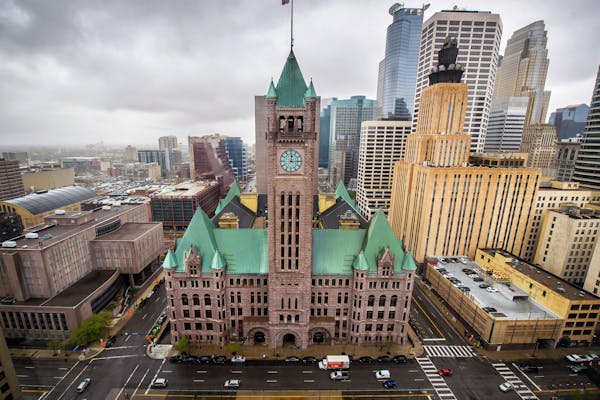Minneapolis is setting up a new community safety office two years after George Floyd's murder prompted a global movement calling for changes to policing.
Mayor Jacob Frey declared it a historic day after the City Council voted 9 to 4 Thursday to create the new agency, which is similar to one voters rejected last year.
"This is one of those rare occasions when we have the opportunity to make a longstanding, multigenerational impact on government structure," Frey said in a news conference. The change will make city government "more efficient, more responsive and more inclusive to the residents of our city."
Council Member Robin Wonsley said it will blur lines of accountability by placing "a new layer of unelected bureaucrats" in the hierarchy.
"Structural changes are just a distraction if they don't come with the political will for solutions," she said during the council meeting.
The questions of whether to create a new agency — and who should have control over it — have featured prominently in debates about how Minneapolis officials should seek to fulfill a promise to transform public safety in response to Floyd's death.
Minneapolis drew international attention when a majority of City Council members stood in Powderhorn Park after Floyd's murder and pledged to "begin the process of ending the Minneapolis Police Department" and create "a new, transformative model for cultivating safety in Minneapolis."
The next municipal elections focused on questions of how the city should set up its public safety systems and who should wield power.
Voters last year rejected a measure that would have allowed city leaders to replace the Police Department with a new agency providing "a comprehensive public health approach to safety." It also would have eliminated minimum staffing requirements for police and removed the mayor's "complete power" over them, likely granting the council more sway .
Voters instead approved a different initiative that designated the mayor as the chief executive responsible for overseeing most city departments and prohibited the council from interfering with his directions. The election also ushered in a second term for Frey, and new members were elected to seven of the 13 City Council seats.
Officials engaged in a public debate about how much, if any, additional work they needed to do to implement the power shift that voters had approved. That debate continued this week, as council members neared a final vote.
Frey had pitched a plan to create a four-person cabinet to help him run city government, arguing that it would encourage collaboration among city departments and improve efficiency by limiting the number of people who report directly to him.
The cabinet was set to include the city attorney, a chief of staff to oversee employees in the mayor's office, a city operations officer to supervise most departments and a new commissioner to supervise the leaders of the police and fire departments, as well as 911, emergency management and violence prevention programs.
A public hearing on Tuesday drew less than a dozen people. Among those speaking in favor were people who had campaigned for the change in city government.
"Minneapolis needs a city that works, with a mayor who is responsible for the direction of the city's future and assembling department heads to provide city services," said Kathleen O'Brien, a former council member and city coordinator who served on the mayor's work group.
Among those writing to raise concerns was former City Council President Paul Ostrow, who supported both measures on last year's ballot. Ostrow noted that the charter that serves as the city's constitution gives the mayor power over police operations and said he believes the proposal to create a commissioner should have gone before voters.
"To me, any lawsuit at this point would be a slam dunk," Ostrow said in an interview. "The proposal that's been made is clearly not what voters approved."
Frey and City Clerk Casey Carl said in past interviews that several differences between this proposal and the last one — that the Police Department would still exist as its own agency, that power isn't shifting among elected officials — allow city leaders to make the change without sending it back to voters.
In a news conference Thursday, City Attorney Kristyn Andersondefended the new ordinance, saying the new safety office still reports to the mayor "so it still preserves the mayor's authority over the police."
"What we've got is fully lawful," she said.
Council Vice President Linea Palmisano welcomed the change, saying in the council meeting: "The voters spoke. They wanted this new form of government, and we are responding to the voters' will by working collaboratively to implement this new structure."
Council Member Jeremiah Ellison said he was "taking the good with the bad."
"I do think there are still big questions about how we're going to function within this system," he said. "It's new to all of us. It certainly has been an education."
Ellison added that he was encouraged by efforts to come up with a clearer plan for addressing constituent services and to support work done by employees in the city's Office of Performance and Innovation and Office of Violence Prevention.
Voting for the change were Council Members Ellison and Palmisano, LaTrisha Vetaw, Michael Rainville, Lisa Goodman, Andrew Johnson, Jamal Osman, Emily Koski and Council President Andrea Jenkins. Voting against were Council Members Wonsley, Elliott Payne, Aisha Chughtai and Jason Chavez.
Elected officials are now expected to turn their attention to budget negotiations, which will determine staffing and funding for some of the new offices.
"We imagine that much of this will be set up in full by the end of the year," Frey said. "However, to be clear, there will still be kinks that need to be worked out over the next couple of years."
New Minnesota GOP leaders seek peace with party's anti-establishment wing

Who is Republican Lisa Demuth, Minnesota's first House speaker of color?

Minnesota House GOP, Secretary of State Steve Simon return to Supreme Court
Supreme Court sides with DFL and Simon, says 68 House members needed for floor action

